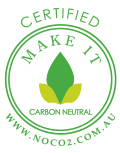Bluegum is an Australian owned promotional product manufacturing and distribution business that has operated for over 30 years. We are conscious of our corporate responsibilities and are committed to conducting our business in a fair, honest and responsible manner in accordance with all environmental and government regulations. Our ISO 9001 Quality Management system Certification ensures we deliver premium product solutions that exceed our client expectations.
Bluegum plan on setting goals that have a carbon emission offset program to support our desire to operate in an environmentally sensitive manner consistent with our beliefs and those of our business partners. Bluegum will be implementing programs for our Corporate, Educational, Government and other organisations with aligned values to offset 100% of carbon emissions generated by the products they purchase.
Environmental Action:
Bluegum is a LowC02 business certified by the Carbon Reduction Institute (CRI) under the NoCO2 Program. To achieve this status and become a low carbon economy member, Bluegum undertook the following process:
- Bluegum commissioned a LowCO2 audit from CRI to measure their operational carbon footprint for the 2018 financial year (FY2018). CRI’s LowCO2 audit follows the standards outlined by the World Business Council for Sustainable Development’s Greenhouse Gas Protocol Corporate Accounting and Reporting Standard (1).
Under the protocol Scope, 1 & 2 emissions are required to be measured while Scope 3 emissions do not need to be measured. The LowCO2 Audit measures emissions relating to all Scope 1 & 2 emissions and Scope 3 emissions relating to staff travel and waste as these emissions fall within Bluegum’s financial control. - Bluegumhave committed to an ongoing program of offsetting their operational emissions in an approved Verified Carbon Standard project; namely the China Wind Project, and
- Bluegumhave committed to ongoing annual auditing of their emissions.
What does LowCO2 mean?
By meeting the requirements of LowCO2 certification under the NoCO2 Program, Bluegum is now a low carbon economy member. Bluegum have measured and offset their operational emissions, as outlined above.
What Carbon Credit Project does Bluegum purchase units from?
India: Clean energy from biomass
Environmental problems in India are growing rapidly. The increasing economic development and a rapidly growing population that has taken the country from 300 million people in 1947 to more than one billion people today is putting a strain on the environment, infrastructure, and the country’s natural resources.
India’s air pollution is exacerbated by its heavy reliance on coal for power generation. Coal supplies more than half of the country’s energy needs and is used for nearly three-quarters of electricity generation. While India is fortunate to have abundant reserves of coal to power economic development, the burning of this resource, especially given the high ash content of India’s coal, has come at a cost in terms of public health risk and environmental degradation.
Reliance on coal as the major energy source has led to a nine-fold jump in carbon emissions over the past forty years. The government estimates the cost of environmental degradation has been running at 4.5% of GDP in recent years.
Biomass projects are implemented in small or large industrial plants. Their aim is to utilize agricultural waste or other non-renewable biomass residues as fuel to generate power and to lower the plants’ dependence on the local grid for electricity. Before the implementation of the project, the electricity needs of such plants were met by power from a coal-dominated grid. To meet the rising energy demands in production, a new efficient biomass boiler was installed together with a steam turbine, producing both steam and electricity. The new boilers are fuelled with locally available agricultural waste instead of traditional, emission-intensive coal.
Before the start of the project, these agricultural residues were not used. They were either burned without harnessing the resulting thermal energy or simply left to decay, thereby generating methane emissions. The plant’s steam and electricity requirements can be now supplied by the new cogeneration unit. The investment required for the installation of the new cogeneration unit could not have been raised were it not for the revenue from sales of carbon credits.
Beyond the reduction of greenhouse gases, these projects contribute to local sustainable development by:
- Creating jobs
- Creating additional income for farmers from agricultural waste
- Alleviating the load on the unstable regional electricity grid
- Reducing emissions
- Creating a business case for regional empowerment through environmentally friendly technology, and
- By utilizing locally available, sustainable fuel sources thereby reducing the dependence on energy imports on a national level







